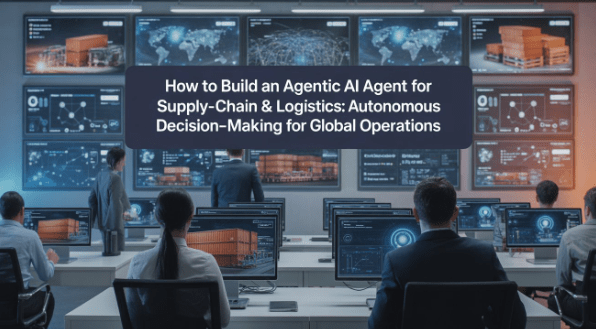According to Gartner, by 2030, 50% of Supply chain management systems will use AI agents to autonomously execute decisions. The market of Agentic AI in supply chain management globally was valued at $8.67 billion in 2025 and is projected to reach $16.84 billion by 2030, which shows significant growth in the use of Agentic AI in Supply chain management and logistics. With the use of real-time Agentic AI, many logistics companies have seen a 22% increase in orders, which encourages many global logistics companies to integrate Agentic AI to work smoothly and efficiently.
Agentic AI is not just limited to learned patterns but works beyond that; it’s a revolutionary step in artificial intelligence, which has the ability to plan, perceive, and act towards specific goals.
Why Supply Chain Needs Agentic AI?
In today’s volatile Global economy, the manufacturing sector operates within vast networks. From raw material procurement to last-mile delivery, every link in the chain faces constant disruption due to geopolitical tension, constant pressures, and fluctuating demand.
Agentic AI empowers the manufacturing sector to work with resilience and utmost efficiency.
Agentic AI helps in monitoring real-time data from suppliers, transportation partners, and acts autonomously by rescheduling appointments, reallocating inventory, any urgent production changes.
Many global logistics companies face lots of challenges, like volatility in demand, disruptions caused by conflicts, data fragmentation, and sustainability pressure. To tackle these problems, it becomes necessary for companies to integrate Agentic AI to work efficiently. Building an Agentic AI in the global supply chain enhances the work process for the company.
Examples of Global Logistics companies that integrate Agentic AI
FedEx Corporation is one of the world’s largest logistics and transportation companies, operating in over 220 countries. Handling millions of shipments daily, FedEx manages a highly complex supply network across air, ground, and sea — making it an ideal candidate for agentic AI development.
FedEx is a transportation company that integrates an AI-driven route optimization system, which helps in adjusting dynamic delivery routes. It is one of the largest cargo airline fleets in the world. They use machine learning and predictive AI to monitor aircraft and vehicle health through IoT sensors.
Agentic AI improves customer visibility, which provides real-time transparency for clients. It also provides sustainability, which results in a lower carbon footprint.
Steps to build an Agentic AI system
When building an Agentic AI in the Global supply chain, it is important to design a layered architecture that shows how human organization operates. There are 3 types of layers, namely: perception, cognitive, and action layers.
- Perception Layer
This layer interprets data from multiple sources, like Supplier APIs, warehouse sensors,
Market feeds, weather data, risk indices.
- Cognitive layer
Multiple specialized agents deliver in the cognitive layer. It includes an inventory agent,
Consulting an AI agent, a procurement agent, demand forecasting agent.
- Action layer
Once the decision is made, action takes place, which includes rebooking shipments in
Logistics system, updating inventory or production schedules.
Tailored agentic AI Solutions for Supply Chain and Logistics
A trusted Agentic AI development company that focuses on custom Agentic AI-tailored solutions is necessary because every manufacturer and marketing enterprise operates differently.
Engagement process
- Strategic Discovery: It helps in assessing operational challenges, data landscape, and
KPIs.
- Architecture Design: Helps in building a scalable, modular, agentic AI blueprint aligned
With your logistics system.
- Agent Development: Helps in training custom agents from forecasting to procurement
Using AI/ML.
- Integration and testing: In this process, agents are integrated securely with existing
Software.
- Continuous optimization: In this process, the AI system learns and evolves with the market changes.
Key Supply Chain Challenges that AI agents solve
- Increasing customer expectations: To meet customers’ demand supply chain must enhance the speed and adaptability. Streamline managers must leverage Agentic AI for customer service.
- Managing risks and disruptions: Supply chain management is vulnerable to dangers such
as cyber attacks, natural disasters, etc, which can cause delays. Supple chain managers
must proactively mitigate risk for resilience operations by utilizing Agentic AI efficiently.
- Balancing cost and sustainability: Supply chain managers must minimize expenditures
and enhance operational efficiency. With the use of Agentic AI, enhancing sustainability
, which results in reducing carbon footprints.
- Demand Variability: Fluctuations in customer demand hamper supply chain management
Process. Managing and predicting demand accurately is crucial for optimizing inventory
Levels.
Agentic AI Consulting Services for Global Supply Chain Transformation
Agentic AI consulting services provide end-to-end strategy, design, and implementation support for global logistics and manufacturing networks. It not only helps in identifying automating opportunities but also in deploying adaptive AI agents across procurement, warehouse, and transportation. The consulting team helps in specializes in building scalable frameworks that integrate seamlessly with CRM systems. In order to optimize the distribution network, enhance demand forecasting, Agentic AI consulting service delivers the expertise and technology foundation needed to drive efficiency, resilience, and competitive advantage in today’s global supply chain.
Future prospects of Agentic AI in the Global Supply Chain
Agentic AI is going to revolutionize every sector as it improves efficiency and enhances accuracy. As the supply chain becomes increasingly complex, Agentic AI will enable real-time coordination between manufacturing plants and, transporting hub. Future agentic AI will not just react to disruptions; it will predict, plan, and execute alternative strategies autonomously, minimizing human interventions while improving speed, cost efficiency, and sustainability.
Moreover, the next generation of agentic AI development companies will focus on building explainable and ethical AI systems, ensuring accountability and compliance across jurisdictions. For global manufacturers and marketing organizations, these innovations will help in building resilience and efficiency.
Conclusion
With the ongoing global complexity in the supply chain and logistics sector, the integration of Agentic AI marks a landmark in the era of advanced technology. It not only helps in automating tasks but also works in dynamic environments.
Whether you want to hire Agentic AI developer teams or engage a long-term strategic partner, an Agentic AI development company brings the tools, expertise, and vision to transform your global operations.
The future of the supply chain is not just digital, it’s agentic, autonomous, and adaptive.











